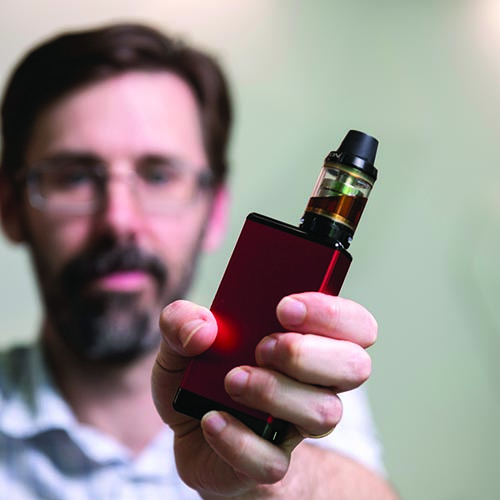Search
Research
Pulmonary Gas Exchange Improves over the First Year in Preterm Infants with and without Bronchopulmonary DysplasiaRight shift of the peripheral oxyhaemoglobin saturation (SpO2) versus inspired oxygen pressure (PIO2) curve is a sensitive marker of pulmonary gas exchange. The aim of this study was to assess the impact of prematurity and bronchopulmonary dysplasia (BPD) on gas exchange and right-to-left shunt in the neonatal period, and its evolution over the first year of life.

Research into the potential health impacts of vaping is starting to back up concerns that electronic cigarettes (e-cigarettes) are not as benign as many people think.
Research
Simultaneous multiple breath washout and oxygen-enhanced magnetic resonance imaging in healthy adultsLung function testing and lung imaging are commonly used techniques to monitor respiratory diseases, such as cystic fibrosis (CF). The nitrogen (N2) multiple-breath washout technique (MBW) has been shown to detect ventilation inhomogeneity in CF, but the underlying pathophysiological processes that are altered are often unclear.
Research
Increasing airway obstruction through life following bronchopulmonary dysplasia: a meta-analysisFew studies exist investigating lung function trajectories of those born preterm; however growing evidence suggests some individuals experience increasing airway obstruction throughout life. Here we use the studies identified in a recent systematic review to provide the first meta-analysis investigating the impact of preterm birth on airway obstruction measured by the forced expiratory volume in 1 s (FEV1) to forced vital capacity (FVC) ratio.
Research
Risk factors for poorer respiratory outcomes in adolescents and young adults born pretermThe respiratory outcomes for adult survivors of preterm birth in the postsurfactant era are wide-ranging with prognostic factors, especially those encountered after the neonatal period, poorly understood.
Research
Normal values of respiratory oscillometry in South African children and adolescentsNoninvasive measurement of respiratory impedance by oscillometry can be used in young children aged from 3 years and those unable to perform forced respiratory manoeuvres. It can discriminate between healthy children and those with respiratory disease. However, its clinical application is limited by the lack of reference data for African paediatric populations. The aim of the present study was to develop reference equations for oscillometry outcomes in South African children and adolescents.
Research
Arsenic and respiratory diseaseArsenic is the only environmental toxin that has been linked to both malignant and nonmalignant respiratory disease following ingestion, rather than inhalation, making arsenic a unique toxicant to the respiratory system. Chronic exposure to arsenic has been associated with the development of respiratory symptoms, impaired lung function, and chronic lung disease.
Research
Host-dependent resistance of Group A Streptococcus to sulfamethoxazole mediated by a horizontally-acquired reduced folate transporterDescribed antimicrobial resistance mechanisms enable bacteria to avoid the direct effects of antibiotics and can be monitored by in vitro susceptibility testing and genetic methods. Here we describe a mechanism of sulfamethoxazole resistance that requires a host metabolite for activity.
Research
Factors influencing participation in home, school, and community settings by children and adolescents with neuromuscular disorders: A qualitative descriptive studyThis study explored how children and adolescents with a neuromuscular disorder (NMD) and their parents experienced barriers and enablers to the child's participation.
Research
Development of a Symptom-Based Tool for Screening of Children at High Risk of Preschool AsthmaDespite advances in asthma therapeutics, the burden remains highest in preschool children; therefore, it is critical to identify primary care tools that distinguish preschool children at high risk for burdensome disease for further evaluation.
